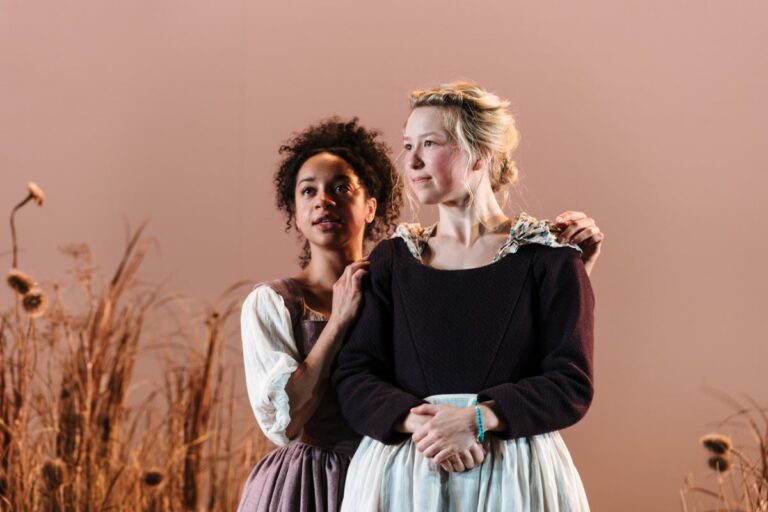“I will be a good woman.” “How can you, when they keep changing the definition?”
What happens when the most powerful woman in the country is suddenly reminded that, after all, she is still just a woman? That’s the question at the beating heart of 1536, Ava Pickett’s razor-sharp, darkly comic and blisteringly relevant new play at the Almeida Theatre.
Set during the final months of Anne Boleyn’s life, 1536 cleverly dodges the Tudor grandeur. Instead, we are rooted in a sun-bleached Essex field, where three young women meet to gossip, share dreams, vent about work and plan their futures. This timeless terrain of girlhood becomes a battleground when news trickles in from London: Henry VIII has imprisoned the Queen in the Tower of London, on charges of treason. The once-familiar dynamics among these young friends begin to shift and sour. The patriarchy, it turns out, doesn’t just operate from thrones and palaces; it creeps into hedgerows and hay bales too.
Winner of the 2024 Susan Smith Blackburn Prize, 1536 is a love letter to female friendship and a sharp dissection of how systemic misogyny deforms even the most intimate bonds. While the play is set nearly 500 years ago, its emotional and thematic undercurrents feel urgently contemporary, especially in the wake of modern touchstones such as Netflix’s Adolescence, which, similarly to this production, explores the slow poison of patriarchal power.
Pickett, a rising voice in British theatre, has written a script that is lean but dense, rich in vernacular and laced with wit. It crackles with the kind of crude yet charming dialogue you’d expect to hear coming from the ladies’ loos in a busy pub – when the girls question why Anne Boleyn would have an affair with her lute player, they all agree, “Well they are good with their hands after all” – until it pivots and hits you with brutal historical and cultural realities. Think Sex and the City, if it were set in a 16th-century mud patch in the east of England.
Central to the play’s success is its phenomenal trio of leads. Siena Kelly, as the cheeky, flirty, yet heartbreaking Anna, in perfect tandem with the script; it feels as though it was written just for her. And her performance throbs with vulnerability and rage. Liv Hill delivers another knockout as Jane, the hilarious, naive “good girl” whose search for safety steers her down darker paths. Tanya Reynolds is compelling, too, as Mariella, with quiet poise and growing disquiet. The chemistry between the three is electric, and at times, achingly brittle.
Their friendship is warm, messy, and alive with the kind of coded shorthand that only years of closeness can bring. But as events in London escalate, their dynamic splinters under the weight of paranoia, judgement, and a creeping sense of doom. They begin to reflect the very structures that oppress them, each absorbing and reproducing the toxic fallout from a world built by men and for men.
.jpeg)
The production is a feast of mood and meaning. The set, designed to evoke the endless churn of English fields, is detailed and earthy. A beautiful, tactile space that feels playful and safe, until it doesn’t. A vast skyscape of sunsets and sunrises looms behind the action, shifting in colour and tone as the narrative darkens, echoing the ramping up of onstage stakes. Director Lyndsey Turner orchestrates it all with characteristic finesse, guiding us from rolling laughter to horror with a barely susceptible gear change.
Yet for all its power, 1536 isn’t perfect. There are some missed opportunities for great expression. The bubbling undercurrent of female rage, so compellingly teased, is siphoned off into a stylised montage of strobe lights, contemporary music and neon green. It’s a choice that jars with the carefully constructed, naturalistic period world, and undercuts what could have been a show-stopping emotional crescendo. Elements of the plot also ring pretty predictable. However, this reads more deliberate than lazy – highlighting the inevitable tragedies of the times then, and the times now.
Still, 1536 pulls the past into the present with unflinching clarity and bitter humour. Pickett skewers how misogyny trickles down from kings and courtiers to village boys and lovers. The result is a play that feels vital and gripping. With its killer laugh-out-loud one-liners, pitch-perfect performances, and chilling observations, 1536 isn’t just a period piece; it’s a call to arms, dressed up as a comedy. The play addresses the impossibility of womanhood; the reason they loved you once will be the same reason they hate you now. A sentiment as true today as it was in 1536.
In the world of 1536, there are no winners, not even queens. But there is laughter and just enough wild hope to make you wish, against all odds, that these girls might make it out alive.
‘1536’ is at the Almeida Theatre, London, until 7 June


